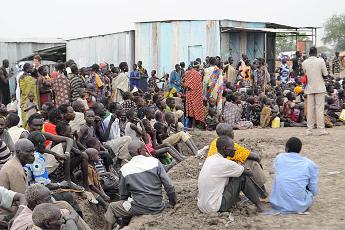Over 120,000 displaced in South Sudan ethnic violence
January 20, 2012 (JUBA) – The United Nations (UN) has expressed serious concerns over the plight of more than 120,000 people, mainly women and children believed to have been displaced by ethnic violence in South Sudan’s largest state of Jonglei.

“I can tell you the violence in Jonglei hasn’t yet stopped,” she said.
“A lot of help is needed to assist those displaced and this should be the number one priority.”
Two weeks ago Grande said the UN had launched an immense emergency operation meant to aid about 60,000 people, but the figure has doubled, raising fears of a humanitarian catastrophe in the troubled region.
In late January as many as 8,000 armed men from the Lou-Nuer tribe attacked Pibor County, which is home to the Murle community.
Before the attack, over New Year over 1,000 were killed in raids and counter raids between the two groups over the previous seven months. As well as cattle being stolen in the raids, women and children are often abducted and properties set fire to.
When the attack began the UN advised citizens to flee Pibor town and other areas. Slowly displaced people are returning to their areas after taking refuge in the bush.
The UN has criticised the media for quoting the Commissioner of Pibor as saying that over 3,000 people died in the Murle offensive. The figure has not been verified.
Over the last week the Murle have attacked Akobo, Uror and Duk Padiet Counties killing more than 80 people, local officials say. The UN says those killed in Duk Padiet could be between 50 and 80. An estimated 300 houses were set on fire in Duk Padiet in Duk County.
On Thursday, Hilde F. Johnson, the Special Representative to the Secretary General (SRSG) warned against hate messages used to incite violence, urging the government and local authorities to institute investigations and bring the perpetrators of violence to justice.
Grande, also the deputy SRSG told journalists in Juba, the South Sudan capital, described their intervention as the “most complex” and “expensive” humanitarian assistance the UN has provided in South Sudan since the 2005 signing of the Comprehensive Peace Agreement (CPA). She appealed to the conflicting parties in the conflict to respect the neutrality of all humanitarian actors in the region.
“We are extremely concerned that humanitarian facilities, including health centres, are being targeted during attacks,” adding that, “We call upon all parties to respect the neutrality of humanitarian partners.”
Grande also decried the poor state of infrastructure, insufficient staff numbers and limited accessibility to the conflict areas. The UN estimates that this year alone, nearly three million could be relatively food insecure in South Sudan.
“I think it is essential that this year’s appeal is adequately resourced early in 2012 to ensure we meet our commitments to the people of South Sudan,” she said.
In November last year, the UN launched an humanitarian appeal for over US $760 million, as part of efforts to address the worsening humanitarian situation in Africa’s newest nation. Areas earmarked include provision of water and sanitation services, education and nutrition.
Speaking at the same press briefing Yasmin Ali Haque, head of the United Nations’ Children Funds (UNICEF) in South Sudan, said children have borne the burden of the ethnic conflict over the last year.
Haque said that 342 children (184 boys and 158 girls) are reported to have gone missing while an additional 254 are believed to have been killed as 70 of them were verified to have died as a consequence of the conflict in 2011.
“As a result of the conflict, 117 children, 65 boys and 52 girls were verified as unaccompanied. Out of 109 children have so far been unified but this may increase as more people returns and more areas becomes accessible,” Haque said, referring to overall figures.
She, however, said the situation was returning to normal as reports from local authorities indicate that recreational kits were helping children bring some joy not only children but also to adults and members of the society.
Earlier, Grande, said assessments are being conducted while relief assistances are also being provided in the conflict affected areas.
A coordination hub has been established in Pibor town with 15 humanitarian organisations already on the ground.
“They are working on water points and are providing food, household items, emergency education, nutrition, protection and medical assistance. Similar assistances are also being provided in Gumuruk, Likuangole, Boma and Walgak, and other villages will receive aid soon”, she told the press conference.
The top UN official explained further that the recent tribal conflict in Jonglei has compounded an already difficult humanitarian situation in the country but said the humanitarians in collaboration with the government were committed to restoring lives of the affected communities.
“Before the crisis in Jonglei, partners were over-stretched, and are now supporting 30 simultaneous emergency operations”, she said explaining that more than 350,000 people were forced from their homes in 2011 when tensions on the border with Sudan escalated, triggering fresh displacement.
“You may be aware that violence which erupted in Abyei displaced 110,000 people into Agok and neighboring areas in South Sudan. The ongoing conflict in South Kordofan and Blue Nile states in Sudan uprooted an estimated 80,000 people. Some people have fled into Ethiopia while others entered South Sudan since June 2011. Hundreds of new refugees continue to arrive every week”.
Grande stressed that “operations in South Sudan are some of the most difficult and expensive in the region due to the combination of poor infrastructure and limited accessibility. It’s a race against time every year to ensure that life-saving supplies are purchased and pre-positioned before the rains arrive. These attacks have occurred at the beginning of the dry season when stocks are at their lowest.”
(ST)
